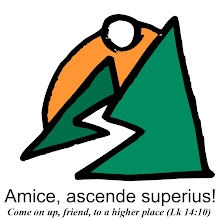
Sunday Morning Worship Guide / Reflection
16th Sunday, Year B July 19, 2009
We live in a complex world … a world of contrasts, filled with contested and contesting values with each one vying for everyone’s attention. Jeremiah’s world was a contrasting one made up of shepherds who led righteously, and shepherds who not only misled, but scattered the flock. St. Paul candidly refers to a “dividing wall of enmity,” and to the reality that at some point in our lives, we “were far off” from God, but that thankfully, we “have become near by the blood of Christ,” he, who “is our peace,” and “through [whom] we both have access in one Spirit to the Father.” The Gospel of Mark alludes to a busy band of twelve, who, along with their Master, “had no opportunity even to eat,” caught up by the motley demands of people who “were coming and going in great numbers.” No less than Christ, “was moved with pity for them, for they were like sheep without a shepherd.”
There is more than just “pity” from Christ, the Good Shepherd for us all who live and move in this world of stark contrasts.
First of all, he shows himself as the fulfillment of the promise given through Jeremiah the prophet: “I myself will gather the remnant of my flock … and bring them back to their meadow … I will appoint shepherds for them so that they need no longer fear and tremble…” Secondly, as our peace, he “broke down the dividing wall of enmity … thus establishing peace …he came and preached peace to [those] who were far off and peace to those who were near …” Thirdly, he invites us today and every busy day to “come away by [ourselves] to a deserted place and rest a while.”
Pity alone is not what the Lord gives us today and everyday of our busy lives. Like a true shepherd he shows us the way and guides us. “So they went off in the boat by themselves to a deserted place,” to have some time for rest and reflection, and presumably, for prayer. Jesus’ thoughtfulness, attentiveness, and concern for his apostles’ welfare shine out remarkably clear in this short vignette reported by Mark. Such personal solicitude for the good of his followers is eloquent sign, among others, of Jesus’ intention to live in concrete what he has declared in word: “I am the Good Shepherd. A good shepherd lays down his life for the sheep.” (Jn 10:11)
Sunday, like today, is the Good Shepherd’s offering for us to have some quiet, rest, reflection and prayer. Sunday is as much the “day of the Lord,” (Dies Domini), as the “day of and for man,” (Dies hominis). Sunday is also the day for God’s assembly, the Church (Dies Ecclesiae), where together God’s people, like the Jews in Christ’s times did, saw the Lord as he “began to teach them many things.” (Mk 6:34)
Today, the Liturgy invites us to re-appropriate Sunday for what it really was meant to be: a day for the Lord, as much as a day for ourselves. Rather than seeing Sunday as a day for self-absorption and self-preoccupation, it is to be seen as a day for legitimate rest and solitude, not for one’s selfish motives, but eventually to get closer to God and Christ through prayer and reflection, so that through intimate communion with the Lord, we may rise victorious amidst the contrasting and conflicting complexities of life in this globalized, consumerist, mass media-dominated world. Such intimacy with God, in and through this Eucharistic celebration, ought then to make us capable of proclaiming sincerely and more effectively: ‘The Lord is my shepherd; there is nothing I shall want.”


No comments:
Post a Comment